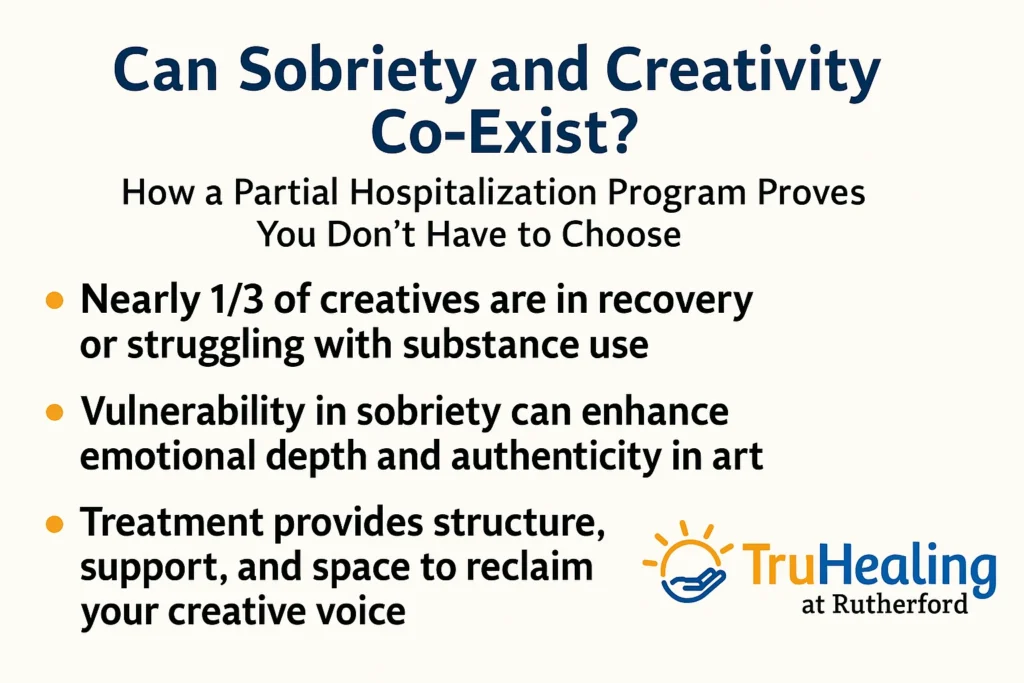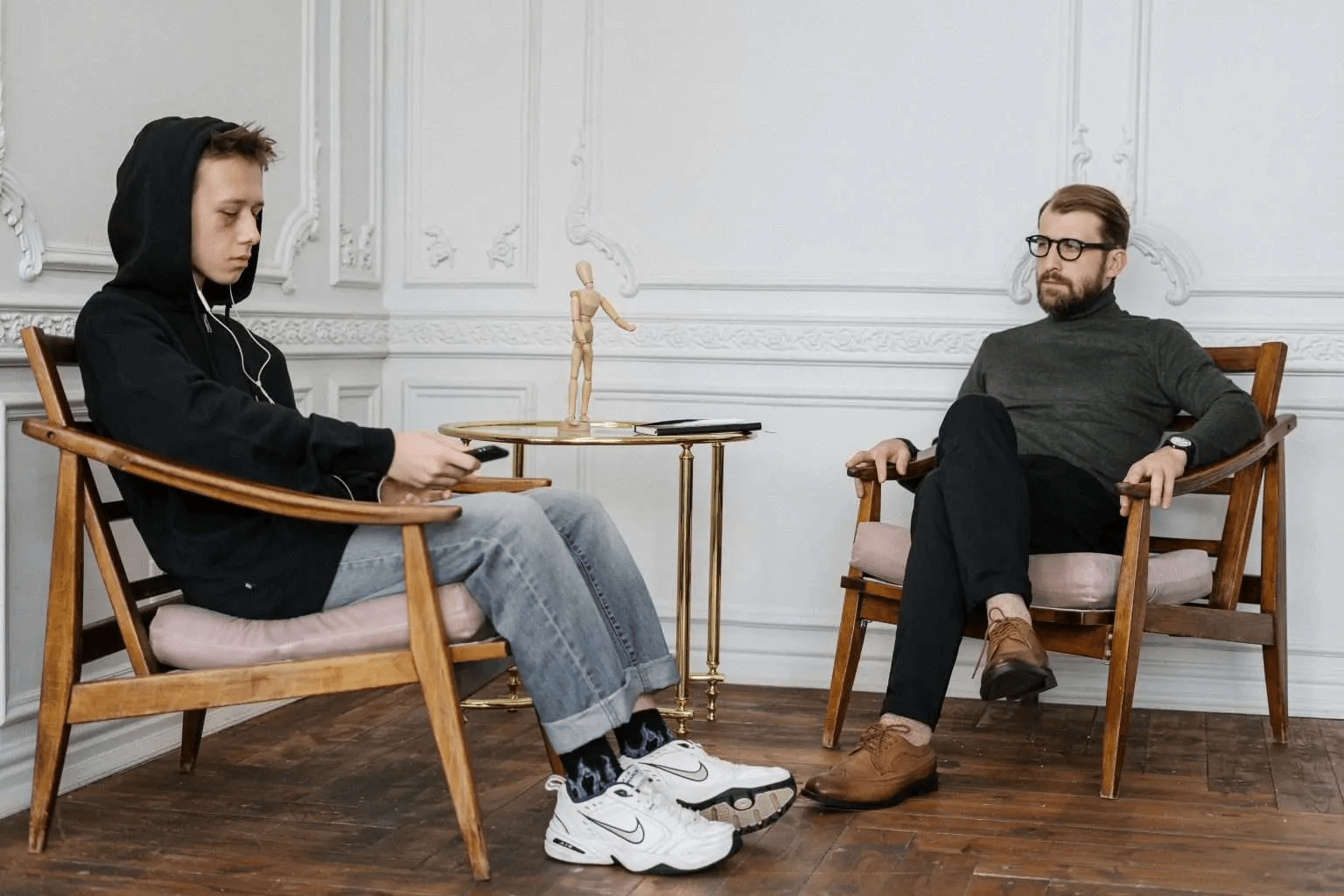There’s a question a lot of creative people are afraid to say out loud: What if sobriety kills my spark?
It’s not about the hangovers or the physical detox. It’s deeper than that. It’s about identity. About the fear that substances aren’t just something you use—but something that fuels the work. That without them, you might go emotionally flat. Uninspired. Invisible.
If that fear lives in you, we want you to know something: you’re not broken for feeling this way. And at TruHealing at Rutherford, we’ve seen firsthand that sobriety doesn’t erase your creativity. It uncovers it.
Why So Many Creatives Fear Sobriety
Substances can feel like a shortcut to emotion. They loosen the grip of shame, crack open vulnerability, quiet self-judgment. For many artists, performers, and highly sensitive people, using wasn’t about escape—it was about access.
So when the idea of sobriety comes up, it’s not just about losing a coping tool. It feels like losing a limb. A color palette. A muse.
But here’s the hard truth wrapped in care: what feels like access often becomes a trap. Over time, the muse demands more. The hangovers stretch longer. The ideas feel foggier. And eventually, the thing that once helped you create becomes the thing that keeps you from it.
A Different Kind of Recovery Space: The Partial Hospitalization Program
You don’t have to vanish from your life to get help.
Our Partial Hospitalization Program in Windsor Mill, Maryland, is built for people who want deep support but still want to stay connected to their lives and creativity. It’s a full-day program with clinical structure, emotional depth, and space to process—not just abstain.
Think of it as rehab with room to breathe. You attend treatment during the day and return home in the evening. It’s recovery that doesn’t require you to go off the grid.
You Don’t Have to Get Boring to Get Better
One of the most painful lies many people believe is that getting sober means becoming someone else entirely. That the version of you who is sober is watered-down, muted, or less interesting.
Here’s what we’ve seen instead:
- A stand-up comic who rediscovered their sharpness—without blackout anxiety.
- A songwriter who wrote more honestly after treatment than they ever could while using.
- A college student who thought alcohol made them sociable—but found out vulnerability landed even harder in the daylight.
Sobriety doesn’t flatten you. It frees you from the thing that kept making your world smaller.
What a Day in PHP Looks Like (for the Creatively Wired)
In our Partial Hospitalization Program, each day is structured to provide therapeutic depth and personal healing. But we also recognize that not everyone thrives in the same rhythm.
For creatives, that might look like:
- Group therapy sessions where you process emotional blocks and trauma
- Expressive therapies that use art, movement, or writing
- Quiet breaks between programming to reflect (or sketch in your journal)
- One-on-one sessions where you talk honestly about the fear of losing your edge
We know structure can feel threatening to a creative brain. But here, structure is not the enemy—it’s scaffolding. It holds you while you rebuild.

Creativity After Sobriety: Not a Loss, But a Shift
What if the best parts of your creativity didn’t come from the substances—but in spite of them?
In PHP, we don’t just treat symptoms. We help you reconnect to the source of your creativity: your thoughts, your emotions, your voice.
Without the fog, many clients say they feel things more deeply—not less. The sadness is rawer, yes. But so is the joy. The laughter. The clarity. The moment you realize: I can do this. I’m still me.
There’s Room for Fear Here
If you’re afraid that sobriety will take away something sacred, we won’t argue with you. That fear is legitimate. We just want you to know it’s not the whole story.
We won’t tell you who you’ll be on the other side. But we can promise you this: we will hold space for the questions. For the grief. For the aching wonder of who you might become without the thing you’ve leaned on for so long.
How to Know If PHP Is Right for You
You might be a fit for a Partial Hospitalization Program if:
- You need daily support but don’t want to live in a facility
- You’ve tried to quit using alone but keep getting stuck
- You’re experiencing depression, anxiety, or identity fear in early sobriety
- You want help—but you don’t want to lose your art, your self-expression, or your soul
And if you’re still unsure, that’s okay. Reach out anyway. Ask the messy questions. You’ll get real answers, not pressure.
FAQ: Creativity, Sobriety, and PHP
Will I still feel creative after getting sober?
Yes—though it may feel different at first. Many people report a temporary dip in creativity early in sobriety, followed by a deeper, more sustainable creative flow as their mind clears and emotions become more accessible.
Can I still write, paint, or perform while in PHP?
Absolutely. Our program encourages healthy outlets of self-expression. Many clients find that art becomes a vital part of their recovery process.
What if I’m not sure I have a substance problem—just a fear I’m relying on it too much?
That’s a valid concern. PHP can help even if you’re not sure how to label your relationship with substances. We’re here to explore—not diagnose.
How is PHP different from inpatient rehab?
PHP offers the intensity of residential treatment but allows you to return home each evening. It’s ideal for those who need more than weekly therapy but can’t (or don’t want to) commit to full-time residential care.
I’ve built my identity around being a ‘wild artist.’ What if I lose that in recovery?
Sobriety doesn’t erase your edge—it redefines it. You’ll still be passionate, bold, and real. But with a steadier grip on the parts of you that don’t want to self-destruct.
Let’s Redefine What a Creative Life Looks Like—Together
📞 If you’re ready to rediscover your voice—not lose it—call (410) 431-3792 or visit our Partial Hospitalization Program page to learn more about services in Windsor Mill, Maryland. Sobriety doesn’t erase who you are. It helps you come home to yourself.
